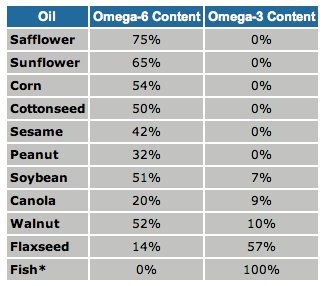The question I want to examine in this article is: Are Vegetable Oils Bad For You?
And the answer depends on who you read. If it’s the medical community and the Federal government, then the answer would be “No.”
If you want my opinion, and the opinion of others who believe inflammation is the primary cause of almost all diseases, then the answer would be “YES!”
And here is the reason why I believe “YES” is the answer to the question are vegetable oils bad for you:
Vegetable oils are extremely high in omega 6 fatty acids, which turns on inflammation.
I talk about this in my article titled “Relief From Chronic Inflammation.” It’s called the Eicosanoid Pathway. The easiest way to understand the eicosaniod pathway is to view it as a light switch.
In fact picture your bathroom as having infrared lights. You know, the ones that when turned on you can immediately feel the heat on your skin.
If you want these infrared lights on, then you flip the bathroom switch to “ON.” If you want the infrared lights off, then you flip the bathroom switch to “OFF.”
The eicosanoid pathway works the same way. This pathway helps turn on inflammation when it’s needed. And once your body has used inflammation in a positive way, to help in the healing process, then it turns off this process.
To make this happen the eicosaniod pathways uses two signaling molecules:
-
One that is pro-inflammatory.
-
And one that is anti-inflammatory.
Pro-inflammatory signaling molecules are produced from omega-6 fatty acids. And anti-inflammatory signaling molecules are mainly produced from omega-3 fatty acids.
Which brings us back to the question are vegetable oils bad for you?
In doing research to answer this question I came across an excellent article titled “How Too Much Omega-6 and Not Enough Omega-3 Is Making Us Sick.” I would encourage you to read this article by clicking here.
In this article by Chris Kresser, M.S., he had the following chart:

As you can see most of the common vegetable oils used in processed foods are high in omega-6 and non-existent, or at very low amounts, for omega-3.
In this article Chris talks about how the ratio of omega-6 to omega-3 used to be 1:1. However, in today’s world the ratio for most people can range from an average of 10:1 to as high as 25:1.
And with modern food processing, Americans get almost 20% of their calories from a single food source, which is soybean oil. If you look at the chart above you see that soybean oil is 51% omega-6 and 7% omega-3. This gives it a 7:1 ratio.
So why does the federal government and the health profession recommend these types of oils?
Are Vegetable Oils Bad For You – Federal Government and Medical Community
The US government Dietary Guidelines 2015-2020 recommend these oils for dietary consumption because they provide “essential fatty acids and vitamin E.”
This is true but they completely overlook the effect these vegetable oils have on inflammation.
Even the respected Harvard Medical School promotes the use of omega-6 in their article titled “No Need to Avoid Healthy Omega-6 Fats.” To get their full perspective on this issue I would suggest clicking here to read their article. Here are a few direct quotes:
“Omega-6 fats from vegetable oils — like their cousins, the omega-3 fats from fish — are good for the heart.
Omega-6 fats, which we get mainly from vegetable oils, are also beneficial. They lower harmful LDL cholesterol and boost protective HDL. They help keep blood sugar in check by improving the body’s sensitivity to insulin. Yet these fats don’t enjoy the same sunny reputation as omega-3 fats.
The main charge against omega-6 fats is that the body can convert the most common one, linolenic acid, into another fatty acid called arachidonic acid, and arachidonic acid is a building block for molecules that can promote inflammation, blood clotting, and the constriction of blood vessels. But the body also converts arachidonic acid into molecules that calm inflammation and fight blood clots.
The critics argue that we should cut back on our intake of omega-6 fats to improve the ratio of omega-3 to omega-6s. Hogwash, says the American Heart Association (AHA).”
As you can see they take a pretty strong stance that this idea of omega-6 fats causing inflammation is “fake science.”
Are Vegetable Oils Bad For You – Dan’s Final Thoughts and Recommendations
Needless to say, I and many others don’t agree. I’m a firm believer that you need to make food choices that reduce inflammation. Especially what’s know as chronic inflammation. Given this here are my 4 suggestions:
-
Reduce your sugar intake to as low as possible.
-
Reduce your intake of vegetable oils, especially safflower, sunflower, corn, cottonseed, sesame, peanut, and soybean.
-
Increase your intake of omega-3 fatty acids either through fish or a good supplement.
-
Increase your intake of antioxidants.
While these 4 suggestions will not completely protect you from potential diseases, they will help you significantly reduce the potential for chronic inflammation. Chronic inflammation is a major contributing factor in almost all disease.

Leave a Reply
You must be logged in to post a comment.